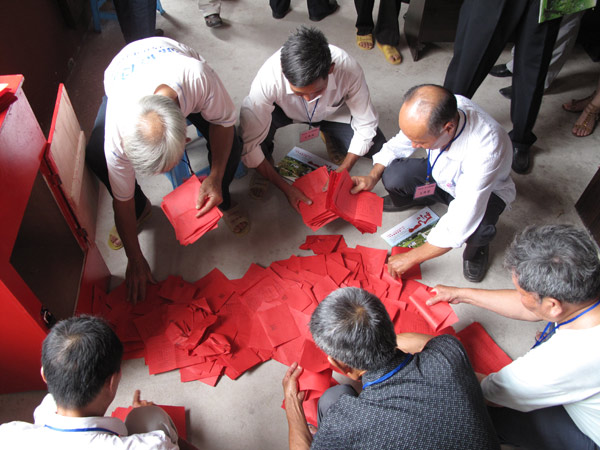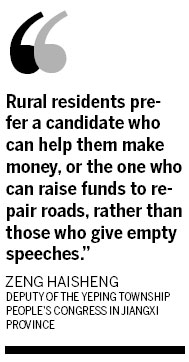Politics
Grassroots candidate tops the poll
Updated: 2011-06-29 08:04
By Zhao Yinan (China Daily)
RUIJIN, Jiangxi - When he started to feed milk cows in his courtyard eight years ago, Zeng Haisheng never expected to become a lawmaker at the local people's congress.
|
 Workers count the results of an election in Yeping village, Ruijin city of Jiangxi province, on June 22. [Zhao Yinan / China Daily] |
One morning this June, the 38-year-old cattleman was told that 10 residents in the neighborhood had recommended him as a candidate for election to the local legislature, the Yeping township people's congress.
"I was surprised and a little bit nervous, that they trust me so much," the tanned small man told China Daily.
Zeng is the owner of the only dairy company in the township, providing more than 20 working opportunities to local villagers.
He was among the four candidates in a race for three positions at the township legislature. As the only grassroots nominee, he admitted he was "not so confident" to compete with the other three, who were recommended by the township committee of the Communist Party of China.
However, on polling day on June 22, Zeng won the most votes.
Voters
Yang Liang is one of the 10 villagers who signed their names on Zeng's recommendation letter. A chicken farm operator, he said his own business is "not as good as expected", and he is thinking of investing in Zeng's dairy farm.

At a meet-and-greet on June 20, Yang asked Zeng: "What's your plan to bring benefits to villagers if elected?"
The cattleman elaborated his plan in detail, such as providing technical guidance to local villagers who are interested in cow feeding, allowing them to become shareholders of his company and signing a contract with the city's largest dairy distributor to ensure sales.
"Rural residents prefer a candidate who can help them make money, or the one who can raise funds to repair roads, rather than those who give empty speeches," the cattleman said after the meeting.
According to research by Peking University's Center for People's Congress and Foreign Legislature's Study, farmers' enthusiasm for democratic elections has been constantly underestimated, and personal interests, instead of citizenship spirit, play a bigger role in grassroots voting.
The study, polling nearly 20 cities nationwide, also found that voters are uncertain whether there is a connection between their interests and the lawmakers, which is the substantial reason why some voters turn a cold shoulder to ballots.
"Could they really solve problems for us?" asked a woman surnamed Zhong, holding her baby in a two-story house in a village of Yeping township.
Along with other neighbors, she was absent from a meet-and-greet for local residents and the deputy candidates.
The 29-year-old mother said she never thought she could turn to local lawmakers to solve difficulties, yet hesitantly asked if they could build a baby-sitting center for the community.
The bank employee said that, like many new mothers in the village, she had no time to take care of her baby since she had to commute between her rural home and the city.
Authorities
Wu Huiqing, head of the election committee under the provincial legislature of Jiangxi, said meetings are one way to introduce candidates to voters and promote election knowledge among the "sometimes indifferent residents".
But holding meetings alone is far from enough, said Chen Sixi, deputy director of the Internal and Judicial Affairs Committee under the National People's Congress.
"Voters need solid proof that their legislature can influence the government and policy-making."
Liu Liang, a senior expert at the Party history research center in Jiangxi's Ruijin city, said the province, being at the forefront of democratic election in China, never lacks in passion for democracy.
Ruijin was the capital of the Chinese Soviet Republic, a former state founded by Mao Zedong and his colleagues in 1931.
The former state held the first anonymous vote after its establishment, setting the prototype of today's democratic election, Liu said.
"Voters cast a soybean in the bowl put behind the candidates, and the nominee who got the most beans was the elected."
Wu Huiqing said organizing grassroots elections in a province with more than 44 million residents is still "no easy task".
Chinese citizens older than 18 who are not legally deprived of political rights are eligible to vote, and their names should be publicized in a bulletin before the election.
Wu said registration work to make sure every qualified citizen is listed can be very meticulous.
"And if the polling day is postponed, they have to do it all over again," he said.
Such work is seeing a geometric growth nationwide.
From this May to the end of next year, more than 2 million deputies will be elected, involving at least 2,000 county-level and 30,000 township-level people's congresses. More than 900 million voters at the county level and more than 600 million voters at the township level will cast their ballots at local polling stations, according to statistics released by the National People's Congress.
"Voting is a public activity to protect local residents' interests, and voters should take initiative rather than passively wait," Chen said.
E-paper

Franchise heat
Foreign companies see huge opportunities for business
Stitched up for success
The king's speech
Tough sail
Specials

Premier Wen's European Visit
Premier Wen visits Hungary, Britain and Germany June 24-28.

My China story
Foreign readers are invited to share your China stories.

Singing up a revolution
Welshman makes a good living with songs that recall the fervor of China's New Beginning.
